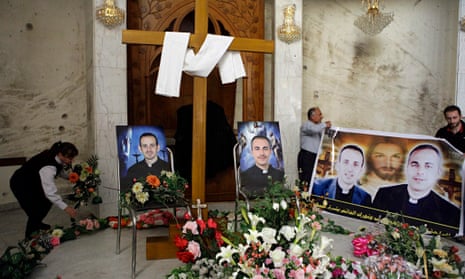Is there a real threat to the religious liberty of Christians in the west? If a Belfast bakery refuses to ice a customer’s cake with a gay marriage message it believes is contrary to the Bible, and then is taken to court, is this a threat to religious liberty? In the US, the claim of “religious liberty” is fast becoming a standard Republican talking point, and we can expect to hear much more of it as the primary season advances.
Democracies can certainly persecute unpopular minorities. No one doubts, for example, that homosexuals were discriminated against in both law and practice throughout most of the 20th century and that this discrimination was both unjust and widely approved, as it still is in Russia and large parts of sub-Saharan Africa today. It’s at least possible that conservative Christians might at some stage end up as despised and disadvantaged a minority as some of their victims have been in the past.
Whether it is in fact happening is a different question. Many of the cases of supposed discrimination amount to Christians wishing to retain a right they had until recently to discriminate against others. They claim then that it would violate their consciences to do or say certain things which society as a whole has determined are moral. This won’t do. Conscience cannot provide “a get out of jail free” card, neither metaphorically nor, should it come to that, literally. We all have consciences but there is no guarantee they will lead us to the same conclusions. This fact is literally tragic, as the Greeks knew. Nonetheless, any society has to privilege some ethical viewpoint and some virtues.
In the west we privilege conflicting but broadly liberal values. We no longer privilege the authority of the Bible. So, once we have determined that discrimination against homosexuals violates the principle of equality – and that is the settled position in both law and public opinion now – the fact that some people are compelled by their consciences to disagree does not exempt them from behaving as if it were true. There cannot be a special exemption for mistaken beliefs held on religious grounds when these harm others.
The difficult cases come when what is at stake is not behaviour, or not just behaviour, but speech or opinion. If there were a clear line between advocacy and action, this would be less difficult. But there is not, any more than there is a clear line between act and orientation. This is where the bakery case, unlike others, is complicated. Christian attempts to convert others may be obnoxious and embarrassing but they should not be illegal as well. There is always a case for tact when dealing with difficult employees. No one should be compelled to make propaganda for a cause they think false or pernicious. With all that said, the overwhelming fact is that claims of persecution are not just groundless but morally distasteful. Compared to the monstrous persecution suffered by Christians in Muslim countries like Iraq or officially atheist ones, being asked to ice a cake for a gay wedding is hardly martyrdom. It’s just the price of living in a civilised society.
